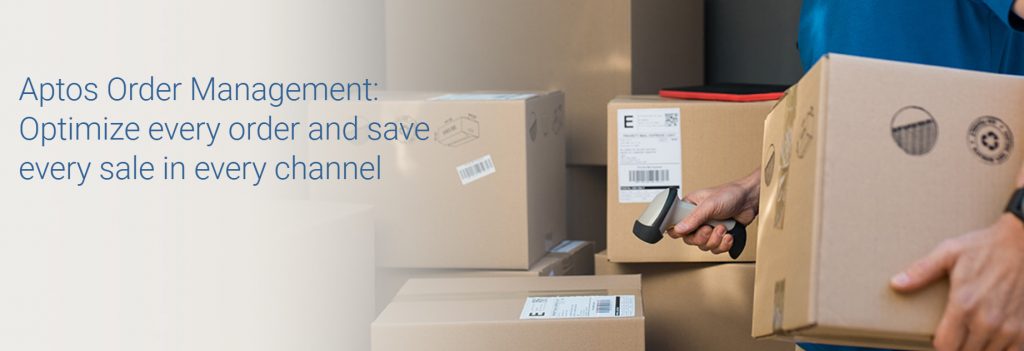 Most of the Aptos Size, the company works with over 1,000 brands in 65 countries, focusing on many sectors. However, Aptos is 100% retail focused. The company employs 1,350 retail specialists who are fully attuned to the retail industry, the needs of their customers and the behavior of their customers’ customers – the end users. When retailers use Aptos, they know they are using software that is designed for retail. But Aptos offers more advantages than just its solutions. Aptos draws on more than 40 years of best practices, uses the cloud to increase efficiency, productivity and growth, supports its customers through long-term partnerships and offers global coverage through offices in the world’s most important markets.
Most of the Aptos Size, the company works with over 1,000 brands in 65 countries, focusing on many sectors. However, Aptos is 100% retail focused. The company employs 1,350 retail specialists who are fully attuned to the retail industry, the needs of their customers and the behavior of their customers’ customers – the end users. When retailers use Aptos, they know they are using software that is designed for retail. But Aptos offers more advantages than just its solutions. Aptos draws on more than 40 years of best practices, uses the cloud to increase efficiency, productivity and growth, supports its customers through long-term partnerships and offers global coverage through offices in the world’s most important markets.Cloud based solutions
The heart of the Aptos technology offering is Aptos ONE, the industry’s only cloud-native, mobile-first, microservices-based retail experience platform designed to help retail businesses capitalize on change. Retailers need a foundation for delivering new customer experiences that can keep up with the fast pace of consumers – Aptos ONE is designed to do just that. With an API-driven architecture, flexible delivery models, shared microservices, dynamic application updates and platform management tools, Aptos ONE supports retailers in their digital transformation.
Aptos’ VP of Retail Innovation, Nikki Baird, dives into store experience innovation strategies that she’s seen break barriers and change cultures. Nikki also challenges the retail industry to reevaluate how store performance is measured now that customer acquisition and brand ambassadorship are higher priorities for many retailers. Nikki is a top global retail industry influencer, former managing partner at RSR Research and was a principal analyst at Forrester Research.
Sustainable Brands Will Be the Ones That Win Consumer Loyalty
Environmental and eco-friendly awareness was trending prior to COVID-19, with retailers and brands rushing to introduce exciting new product lines, partnerships, and initiatives to showcase their sustainability commitments.
During lockdown, the world saw the direct impact that reduced human activity had on the planet – a realization that will encourage even more individuals to practice mindful consumerism in the year ahead. Coupled with the devastating effects of drought, fire, and powerful storms, environmental awareness and sustainability will continue to be top concerns for a growing segment of the population.
As we move into 2021, expect to see more consumers show their affinity for brands that prioritize environmental concerns.
Fashion Moves Out of the Fast Lane; 2021 Makes Way for Slow Fashion
While fast fashion has dominated in years past, disruptions to the supply chain, millennial and centennial buying behavior, and an overall increase in mindful consumerism will accelerate demand for slow fashion. This includes a preference for “timeless” pieces, fashion that transcends seasons, and fashion that can serve multiple functions (home comfort, work, and after-work wear, for when we can get back to in-person gatherings).
In 2021, we’ll see the full impact of the slow fashion trend taking place. The result will be pared-down inventories, product assortments that are narrower than before, and fewer collections, with more collections that are “season-less.”
Retailers Seek Greater Diversification in 2021
Brands that are too narrowly focused – or that found themselves only in the “discretionary” or nonessential category of consumer spending during the pandemic – will seek increased diversification across multiple dimensions in 2021.
It’s not enough to sell products; retailers also need to deliver services that become more essential to consumers – services that either enable the products consumers buy or enable the lifestyle that the products promise.
Retailers also seek to diversify their categories of goods. This accelerates a trend that was happening pre-pandemic, with blurring of retail verticals. An example of this would be grocery stores that sell their own clothing brands. And, with China in particular on the rebound from the pandemic, Western interest in diversifying geographically – especially in China, already a long-established priority region – is on the rise.
This creates new challenges and complexities for retailers as they seek to diversify both business models and geographies at the same time.
With Disruption as the “New Normal,” Digital Transformation Is the No. 1 Priority
COVID-19 has forced retailers to rapidly transform to adapt to a new, digital-first world. Rather than backing off on IT spend in 2021, retailers will keep digital transformation at the top of the agenda – in some cases even doubling down on their investments.
As part of their digital transformation efforts, many retailers will be rethinking the ways they sell. Livestreaming, pop-up shops, rentals, and subscription services are among the options that will be explored. Omnichannel – the creation of seamless experiences as consumers cross channels and touchpoints – will be a high priority, though toward the end of the year, we expect retailers will shift their focus from providing seamless experiences toward providing profitable ones.
In 2021, retailers will be looking for ways to create enterprises built for change that will help them withstand future disruptions.
Finding Relevance in the Pandemic Era
It has never been more vital for retailers to be relevant. Many shifts and changes, twists and turns may lie ahead, but there’s some comfort in knowing where to place your bets. These four mega trends have the power to persevere in the pandemic and post-pandemic era.




